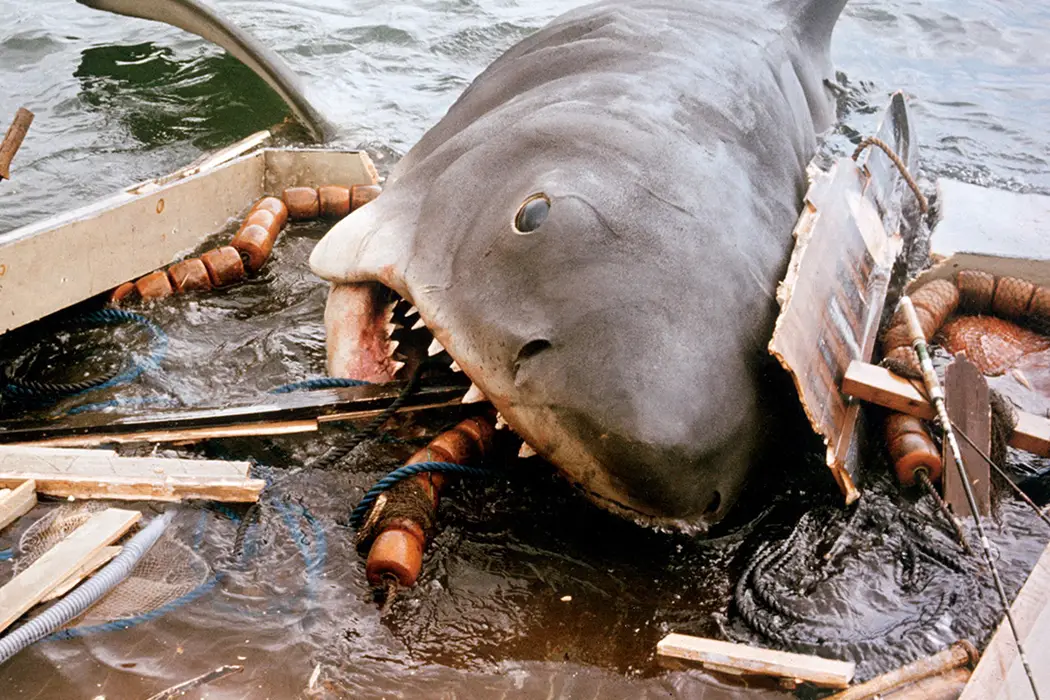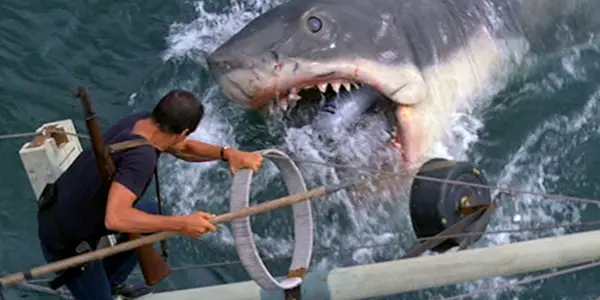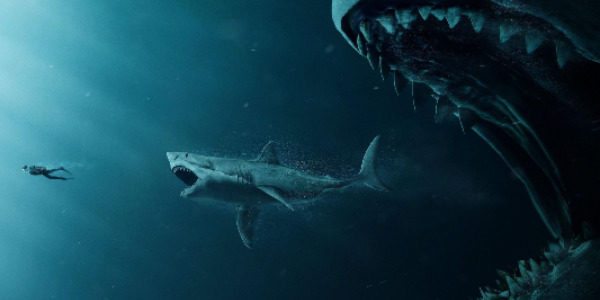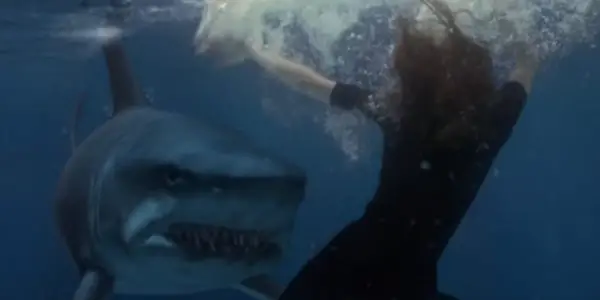Sharks In Cinema & Environmental Anxieties: From JAWS To THE MEG

Caitlin's lifelong love of films began with being shown "Rosemary's…
There are very few creatures that are as infamous in our popular culture as the shark. The iconic image of a shark’s dorsal fin slicing through the surf is a sight that instantly inspires fear and is one that we are all familiar with. Cue the Jaws theme.
The Shark in American Cinema
Popular media and film has capitalized on the public fascination with and fear of the shark for decades, beginning with Steven Spielberg‘s iconic Jaws and bringing the phenomena to a head with the extremely popular Shark Week programming on the Discovery Channel. However, it seems we have reached a turning point in how seriously we take the shark and its place in our culture. Popularity has turned to parody, which has given way to a new generation of ridiculous shark films.
Consider such titles as Ghost Shark, Two Headed Shark Attack, Mega Shark vs. Crocosaurus, and, of course, the Sharknado films. Yes, all 100% real films and all incredibly popular in their absurdity. Even recent big budget shark films like The Meg can’t take themselves too seriously, lest they not deliver on the new expectations of genre fans.
So why has the American audience experienced this shift towards sharks and shark movies, and is it possible that sharks in cinema have a lot to say about current and historical environmental concerns?

First, we must consider the reputation of the shark as a prominent figure in American film and how that reputation has evolved over time. Why are we so obsessed with sharks and shark movies?
The film that put the shark on the map was the 1975 creature feature Jaws, the simple but impactful story of a massive, killer shark that terrorizes a coastal town and the hunt that was launched to bring the shark down. The film had a remarkable impact on the public, leading to mass panic over sharks and widespread hunting and killing of sharks in populated coastal areas. It also led to more shark movies.
From the ’70s to the early 2000s, there were several films released that focused on the idea of an exceptionally large, exceptionally vicious aquatic killer and the bloody chaos that followed in its wake. A few examples of these types film are Deep Blue Sea, The Reef, and Open Water. The shark was portrayed as a mindless monster, hell-bent on devouring every bikini-clad that crossed its paths; and audiences have been eating it up.
The Familiarity and Fear of the Ocean
The ocean has always been a source of fascination and apprehension. Even to this day, we understand very little about the environment of the ocean and are learning more every day. However, despite the mystery, we also have a very close relationship with the sea, as it is now so often utilized by us for travel, commerce, and recreation.
The shark, as the apex predator in such a mysterious environment, has become the focal point of our fears with respect to the sea. The shark is representative of the ocean as an unconquerable force and, in our imagination and understanding, is viewed as having the same ferocity and power that we fear, more generally, in the sea. This makes the shark a perfect villain, as it already cuts a formidable figure as a natural predator, but it also takes on immense symbolic power as the presumed ruler of an element that we cannot fully conquer or understand, yet interact with daily.

This all too human fear of natural forces, along with years of media reinforcement of the idea that a shark is a bloodthirsty killer, lends itself to the mythos of the shark as “the terror of the deep.”
In her book, The Blazing World, Margaret Cavendish characterized the sea as “a super-nature resisting dominance and partitioning” and I think that this statement is the most telling in summing up our apprehensions about the ocean and, by further extension, the shark. We cannot colonize the ocean, we cannot move very freely through it, the resources that we are able to extract from it are limited by what we can reach, and, perhaps most concerning, we cannot see all of it.
Despite the vast reaches of our modern technology, sometimes we only can understand the depths when something new emerges from it and invades our sphere of knowledge. Humanity fears the ocean because the ocean cannot be controlled and we lack a full mastery of it. Likewise, we fear the shark because it rules in a world where we are largely powerless.
Shifts in Shark Culture
In spite of the long-standing history of the shark’s murderous reputation in American cinema and popular culture, many viewers have developed a morbid curiosity about the shark and shark attack and that curiosity has translated into great public interest and popularity. The shark, in many ways, has become a bad-boy celebrity in the animal kingdom. Loved for all the wrong reasons but loved nonetheless.
Enter Shark Week, the Discovery Channel’s annual week-long block of shark based programming aired during the summer months. Shark Week began in July 1988 with the intent of raising awareness and respect for sharks and aired strictly factual programming on the nature of sharks. It holds the record for the longest-running program in cable television history but the format has changed drastically.
Due to the increased popularity of the program, the Discovery Channel has rode the ratings wave and began releasing fictional programs to appease the masses demanding entertainment. Shark Week has become just as much about “docufiction” and the latest and greatest shark TV movie as it is about actual nature footage.
The shift in the focus of Shark Week programs is very much paralleled to the culture shift in attitudes toward the shark, on the whole. This shift has greatly influence the role of the shark in the American entertainment industry, particularly shark movies.
Beginning with the previously discussed fear of a predator that we don’t understand (I would argue that this is in connection to our own primitive trepidation about the ocean), moving into a quest for knowledge and understanding via aquatic discovery, and, finally letting the desire for knowledge fall through to accommodate the insatiable societal need to be entertained. As with so many things, the more one learns about something, the less intriguing it becomes. The mystery is gone.

The factual image of the shark, a simple animal, was not nearly as exciting as the monster created by Jaws, therefore the Discovery Channel had to recreate the monster. This fictional rendering of the predator became the only version of the shark that the public is exposed to.
But, as so often happens with Hollywood monsters, it doesn’t take long for the fear to wear off and for the laughs and parodies to roll in.
In 2009, the Syfy channel released the 19th installment of their extremely popular Maneater Series, Malibu Shark Attack, and sparked a revolution for the shark in American cinema. Up to this point, shark movies had widely been moderate-scaled productions, taking themselves seriously and intent on terrifying their audience. Malibu Shark Attack was meant to be the same, but combine a widely viewed cable channel with some horrendous acting and cheesy special effects and the result is not terror, but hilarity.
Malibu Shark Attack initially received negative reviews but the public demand for cheesy horror films grew and audiences were hungry for filmmakers to chum the water. Syfy delivered to this eager fan base with an increasingly ridiculous lineup of shark focused films. Several other filmmakers (most notably from within the horror genre) got in on the trend and the shark attack horror sub-genre was born and, in the same moment, forever changed into the over-the-top silliness that we’ve come to expect.
Sharks in Cinema and Environmental Anxieties
With sharks in cinema, the danger isn’t just when you go in the water. Nature is bringing the fight to you. By portraying the shark as a monster intent on destruction, in lieu of a simple predator, these films are subtly illustrating the tense relationship between humanity and the ocean, along with undertones of environmental meditations that highlight on the exploitation of sharks and of nature.
This theme becomes especially prevalent when you consider that a fair few of these films are built on the premise of institutional corruption and environmental exploitation. Consider the shark finning boat that was the first victim of the Sharknado, or a power hungry leader of a corporation that unleashed The Meg, and the host of shark films that are born of secret government experimentation, like Deep Blue Sea and Sharktopus.

These films warn against overreaching institutions, placing humans where they don’t belong, and goading the monsters of the deep into exacting their revenge. (Sometimes quite literally, as in Jaws: The Revenge.) Sometimes, on a slightly lesser level, the messaging in these films is as simple as a warning that there are hazards that come with invading unfamiliar territory; every shark movie features a beach scene full of terrorized tourists.
I would argue that the thesis of danger, in the shark genre, is not just the sharks. Sharks are just a symbol for the real threat: that the ocean is capable of exacting revenge on abusive humanity. After all, 40% of our world’s oceans are in jeopardy because of human activity: over-fishing, pollution, and rising ocean temperatures leading to the death of coral reef ecosystems.
Scary stuff when you realize that all life on Earth relies on the ocean.
There’s an argument to be made here about how industrialization and commercial development will ultimately impact nature, what the potential consequences of that disturbance will be, and how much we really have to fear. As I mentioned previously, the shark genre contains many examples of man’s exploitation of nature and the swift and gory retribution on those who abuse Mother Nature.
It’s equally true that the characters that most often weather the storm are those who have knowledge of the balance in nature and respect for the power of the ocean and for the shark, and who see the error of environmental exploitation.
More than Bad CGI and Gore
Beyond catchy scores or bad special effects or bloody fun, shark films have a great deal to say about our own anxieties on commercial exploitation of the environment and the larger question of whether or not we are prepared for the fall. Even the silliest Syfy installation addresses these concerns in a deceptively poignant manner.
Perhaps, as viewers, we go for the gore like a shark to chum, but come back again and again because there is something relatable that we are connecting to. On the other hand, maybe this recent resurgence of the shark in horror is a recognition of our complete disconnect from nature. That the shark now occupies a space in the public imagination as a twisted image of what we perceive the ocean to be.
It is difficult to say for sure, but there is no denying that the shark has our fascination and our imagination caught hopelessly in its jaws.
What’s your favorite shark movie? Do you prefer your sharks a little silly or straight up terrifying? Let us know in the comments!
Does content like this matter to you?
Become a Member and support film journalism. Unlock access to all of Film Inquiry`s great articles. Join a community of like-minded readers who are passionate about cinema - get access to our private members Network, give back to independent filmmakers, and more.
Caitlin's lifelong love of films began with being shown "Rosemary's Baby" at way too young an age. She has been an online content creator since 2014, across a wide array of outlets and subjects. Described as "amazingly and beautifully ruthless," Caitlin resides in Austin, TX and her love of writing on film is only matched by her appreciation for good bourbon and the works of John Carpenter.













